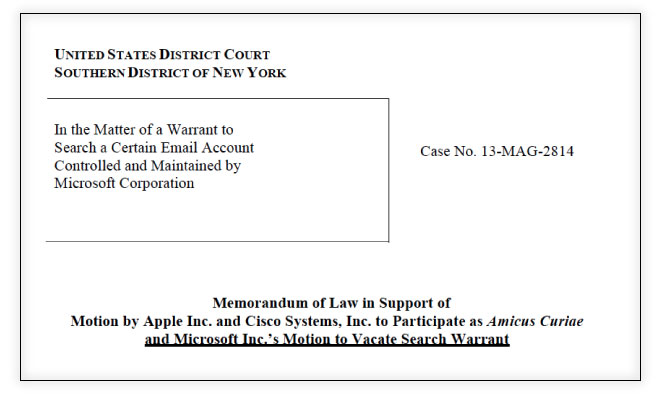
Apple Joins Microsoft In Opposing 'Global Search Warrant' Ruling
June 16, 2014
Apple has joined Microsoft, Cisco, Verizon, and AT&T to oppose a federal court ruling that could force American companies to hand data about foreign customers over to the U.S. government. In doing so, Cupertino is supporting international laws and treaties, according to Gigaom.
In an amicus curiae, or “friend of the court” brief, Apple on Friday joined Cisco in the United States District Court for the Southern District of New York. They agreed with Microsoft’s appeal of a warrant issued by U.S. magistrate judge James Francis IV ordering the company to hand over files from an Irish customer.
 Microsoft says that complying with the order would go against Irish data protection laws, and also defies both the Stored Communication Act "and numerous international law constructs, including treaties the United States has in place with other countries — Ireland among them — regarding how to handle requests for data about each others’ citizens."
In their filing, Apple and Cisco note:
Microsoft says that complying with the order would go against Irish data protection laws, and also defies both the Stored Communication Act "and numerous international law constructs, including treaties the United States has in place with other countries — Ireland among them — regarding how to handle requests for data about each others’ citizens."
In their filing, Apple and Cisco note:
 Microsoft says that complying with the order would go against Irish data protection laws, and also defies both the Stored Communication Act "and numerous international law constructs, including treaties the United States has in place with other countries — Ireland among them — regarding how to handle requests for data about each others’ citizens."
In their filing, Apple and Cisco note:
Microsoft says that complying with the order would go against Irish data protection laws, and also defies both the Stored Communication Act "and numerous international law constructs, including treaties the United States has in place with other countries — Ireland among them — regarding how to handle requests for data about each others’ citizens."
In their filing, Apple and Cisco note:
In rejecting Microsoft's motion to vacate the search warrant, the Magistrate erred by failing to consider the conflicting obligations under foreign and domestic law that arise when courts order providers to produce data about foreign users stored in foreign countries. By omitting this evaluation—and by dismissing the Mutual Legal Assistance Treaty ("MLAT") process out of hand with no factual findings regarding the Irish MLAT at issue—the Magistrate placed the burden of reconciling conflicting international laws squarely on U.S. providers.The Electronic Frontier Foundation is also supporting Microsoft's efforts. The San Francisco, California-based organization was founded in 1990 and "champions user privacy, free expression, and innovation through impact litigation, policy analysis, grassroots activism, and technology development," according to the group's website. Apple and Microsoft don't agree on many issues. On this one they do, which is good news for privacy advocates. Via: AppleInsider Image: TechCrunch

